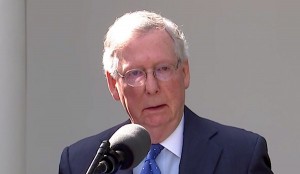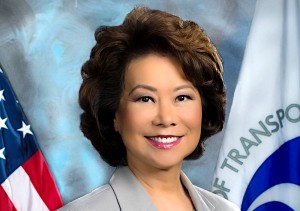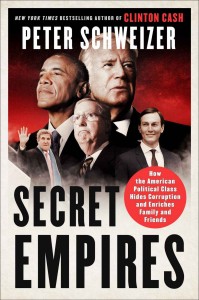Senate leader, Transportation secretary spouse exposed in new book
WASHINGTON – It’s a dirty little Washington insider story that has been under the radar for 18 years.
How Senate Majority Leader Mitch McConnell and his wife, current Transportation Secretary Elaine Chao, used their political influence in Washington to tap into what has become a personal fortune thanks to direct or indirect Chinese cash.
Along the way, McConnell went from being a Senate leader wary of China to its biggest booster, while Chao parlayed more Chinese cash into turning the Heritage Foundation’s policy toward China and securing a Cabinet post in George W. Bush’s administration.
The story is about to get hotter as investigative reporter Peter Schweizer’s newest book, “Secret Empires: How the American Political Class Hides Corruption and Enriches Family and Friends,” released in March. It was Schweizer who authored 2016’s “Clinton Cash,” exposing the remarkable ways Bill and Hillary Clinton used their family foundation to rake in cash, much of it foreign, even when she was serving as U.S. secretary of state.
Bottom line? McConnell and Chao had an average net worth of $3.1 million in 2004. Ten years later, while working only in government, that figure rose to between $9.2 million and $36.5 million.
One source of the fortune, according Schweizer, was a 2008 gift from Chao’s father, James Chao, who had close ties to former Chinese President Jiang Zemin, and whose company, New York-based Foremost Maritime Corp., ships goods to China and buys ships from the China State Shipbuilding Corporation. Chao and Jiang, now in their 90s, were classmates at Jiao Tong University in Shanghai and maintained ties ever since.
WND has been reporting these ties, the China-to-Washington money-go-round and even Chao’s influence at the Heritage Foundation when she worked there in the 1990s and again, following her time in the Bush administration, from 2009 through 2012, as a rainmaker who turned the leading conservative think tank into one that had virtually negative to say about Beijing during her time there.
As early as January 2001, when she was first nominated to be Bush’s secretary of labor, WND interviewed noted Chinese dissident Harry Wu who expressed grave reservations about Chang and the influence she would have on the administration’s China policies.
“I worry about Elaine Chao’s business relationship with communist China,” Wu said in 2001. “This woman has a significant shipping business through her father.”
In 1994, James Chao, along with his daughter and her husband, McConnell, visited mainland China and met with Jiang. James Chao, along with his daughter, returned to China the next year to take an honorary professorship and presidency at the Shanghai Maritime College. When Jiang visited the White House in 1997, he met privately for about 20 minutes with Chao and McConnell, before an elaborate state dinner for Jiang hosted by President Clinton. The Kentucky senator met again with Jiang the next morning.
“He was trying to emphasize that the U.S. and China are natural friends, and their futures are intertwined, and that they should try to understand each other,” Elaine Chao said in describing her talks with Jiang.
She has lobbied for normalized trade with China and has downplayed concerns about China’s growing military threat, espionage campaigns in the U.S. and human-rights abuses.
Wu, a Hoover Institution fellow, criticizes Chao for glossing over the fact that China is and was run by Communist hard-liners who pump proceeds from U.S. trade back into military front companies run by a privileged class. A prominent human-rights activist, Wu spent about two decades in Chinese prisons for his political views.
“I’m very surprised Bush would pick her to head labor, especially when most of the profits from trade with China goes into the pockets of socialist leaders, not workers,” Wu said.
Both Chao and McConnell served on the board of the China Foundation, a nonprofit charity devoted to helping develop rural parts of China.
McConnell has been China’s biggest Republican booster in the Senate. Chao sought out John Huang to help raise money for Republican senators in 1989 – beating Bill and Hillary Clinton to the punch in 1992. In 1993, Huang, then head of Lippo Bank, rounded up a coalition of Chinese banks and individuals to sponsor Chao’s visit to Los Angeles as the new head of United Way. Huang gave McConnell $2,000 in illegal donations as part of a foreign money-laundering scheme – one of only two contributions Huang made to Republicans.
Chao criticized the prosecution of Huang in the Chinagate scandal as racially motivated. For his part, McConnell pressured then-Sen. Fred Thompson to drop his investigation into Chinagate.
As recently as November 2016, when President Trump nominated Chang for secretary of transportation, WND reported on her relationship with China and other concerns including her deep ties with the anti-coal Bloomberg Foundation, as well as her support for the Trans-Pacific Partnership.
When she served the conservative Heritage Foundation as Asian studies adviser, a military analyst who sounded warnings about Chinese threats to U.S. security was shown the door, WND reported at the time. Chao served at Heritage beginning in 1996 before leaving to become Bush’s labor secretary in 2001. While at Heritage, the think tank opened an office in Hong Kong.
Some reports by the ousted Heritage analyst – 16-year veteran Richard Fisher Jr. – were footnoted in the declassified version of the bipartisan Cox Report, which documented Chinese espionage at U.S. defense labs, while warning of China’s goal of modernizing the People’s Liberation Army to project power past the mainland’s waters, targeting U.S. allies like Taiwan and even the U.S.
“Elaine Chao was part of the deal that got Rick Fisher fired from Heritage,” a congressional aide who worked with him on China matters told WND. “She pushed him out not because of free-trade issues, but because he raised national security concerns over China.”
A Heritage insider agreed: “She was not supportive of any of his writings on the Chinese military.”
One of Chang’s long-time patrons was Maurice “Hank” Greenberg, a pro-China lobbyist whose insurance company does business in China. During a Heritage debate over normalizing trade with China, Greenberg protested a Heritage paper by analyst Stephen J. Yates. It suggested Congress postpone the vote on the trade bill to consider adding national security measures, such as tightening controls on exports with military applications.
After Greenberg threatened to cut off funding, Heritage issued a new report: “How Trade with China Benefits Americans,” which was co-authored by Fisher’s replacement, Larry M. Wortzel, at the Asian Studies Center.
The May 5, 2000, report buried concerns about China’s defense buildup and its hunger for military-related exports.
Greenberg, chairman and chief executive of New York-based American International Group, gave Heritage $180,000 in 1998 and at least $100,000 a year for more than a decade through his Starr Foundation.
It’s worth noting that leadership at Heritage has completely turned over in the years since Chao left.
Greenberg and AIG, through its employee PAC, also have donated thousands of dollars to Chao’s husband, Sen. Mitch McConnell, federal records show. AIG and McConnell have been major boosters of cozier trade relations with China – something that would seem to be anathema to Trump.
Together with five other corporate giants, the $26 billion-in-sales AIG formed the Business Coalition for U.S.-China Trade to help spin the press on the benefits of open trade with China.
AIG, with offices in Shanghai, is a major client of Henry A. Kissinger, who has gotten rich as a paid consultant for U.S. companies seeking greater access to China.
“Hank Greenberg is Kissinger’s money bags,” said the Hill aide, who asked not to be named. McConnell and Greenberg also appear to be close. The senator has given paid speeches for AIG, and he has stepped in on its behalf in federal disputes.
In 1987, for example, McConnell tried to spare AIG from having to pay claims on the $200 million policy it underwrote for the U.S. Embassy in Moscow. The bugged building had to be rebuilt.
Like Chao, Greenberg was one of the “Bush Pioneers,” responsible for raising more than $100,000 for the president-elect’s campaign. Bush’s father, one-time U.S. ambassador to China, took the insurance magnate along with him on his 1992 trade mission to Asia.
WND reported back in 2001 that a review of financial assets held by Chao and her husband, McConnell, reveals she has served as a director of an insurance company that jointly owns a Lippo Group subsidiary with the Chinese government. Indonesia-based Lippo is controlled by the Riady family and was at the center of the Clinton Chinagate fundraising scandal.
Lippo chief executive James T. Riady agreed to plead guilty to a felony charge of defrauding the U.S. government by funneling donations to the campaigns of Bill Clinton – and others.
Senate financial-disclosure records show that Chao held a seat on the board of Protective Life Corp., which owns 50 percent of CRC Protective Life Insurance. Lippo co-owns the rest of the Hong Kong-based unit with China Resources Holdings Co., an intelligence-gathering front company for China’s People’s Liberation Army.
Recall Trump’s strong campaign opposition to the TransPacific Partnership, or TPP? While Trump swept to power by denouncing TPP, McConnell announced in 2015 that he would surrender Congress’ ability to amend the agreement and permit the Obama administration to work out the details. TPP became so unpopular during the 2016 election that even Hillary Clinton had to come out against it.
The sweeping secretly negotiated agreement, by some accounts, would have affected everything Americans eat, every drug they take and every BTU of energy they use.
“A wag would be forgiven for saying the TransPacific Partnership describes the majority leader’s marriage to Elaine Chao,” wrote anti-TPP activist Curtis Ellis, a WND columnist. “The former Chinese Communist Party boss Jiang Zemin is a close family friend of Elaine Chao’s, and Chinese Premier Wen Jiabao has praised her father for building up China’s industry. (Shipping to and from China is the Chao family business.) Lest we forget, Jiang Zemin was the hardliner who took power following the Tiananmen Square massacre and is notorious for repressing religious minorities and Tibetans. Jiang’s been indicted for genocide and is fighting to hold on to his corrupt fiefdom in Shanghai. Some friend.”
What has Chao been up to more recently – before being selected by Trump for the Cabinet post?
Chao served on the board of directors of Bloomberg Philanthropies, the foundation started by New York Mayor Michael Bloomberg, another anti-Trumper who flirted with the notion of running a third-party candidacy against him. Bloomberg gives the Sierra Club’s “Beyond Coal” campaign $50 million a year. The objective? To end the country’s reliance on “dirty coal, plant-by-plant, community-by-community, state-by-state.” Trump promised to put the coal miners back to work.
Chao has also served on the board of Wells Fargo, which has bankrolled anti-coal efforts. Ironic since McConnell’s home state is Kentucky – coal country.
Chao was selected by Bush to head the Labor Department after his first choice, Linda Chavez, withdrew from consideration over charges she harbored an illegal alien in 1992. Chao, 63, a Taiwanese immigrant, has also served as chairwoman of the Federal Maritime Commission. She became director of the Peace Corps in 1991 and led the United Way of America from 1992-1996.
Meanwhile, as to what Schweizer has uncovered about the McConnell-Chang alliance and the “gift” from her father of $5 million and $25 million, the author believes it may have been a payoff for the couple’s loyalty to China, the source of the Chao family fortune.
“Secret Empires” details myriad examples of corruption from members of both major political parties. Rather than focusing on direct forms of corruption, such as bribes, Schweizer hones in on the more indirect graft of the modern era.
“Current ethics laws create a zero accountability zone for the Washington, D.C., political class,” Schweizer says. Rather than risk their careers taking bribes for potentially minuscule rewards, Schweizer points out how today’s politicians are savvier, engaging in what he calls “corruption by proxy.”
“Foreign governments and oligarchs like this form of corruption because it gives them private and unfettered gateways to the corridors of Washington power,” Schweizer writes. “Foreign entities cannot legally make campaign contributions, so using this approach creates an alternative way to curry favor and influence America’s political leaders. Simply camouflaging these transactions as business agreements provides another shield of plausible deniability.”
As Schweizer tells it, the Chao family fortune derives from the Foremost Group, a shipping company that Chinese native James Chao, a classmate of former Chinese president Jiang Zemin at Jiao Tong University, founded in New York in 1964. Chao remains Foremost’s chairman today, and his daughters Angela and Christine are the company’s deputy chairwoman and general counsel, respectively. Elaine Chao worked there in the 1970s, and has been quoted as saying, “Shipping is our family tradition.”
The success of Foremost is largely due to its close ties to the Chinese government, in particular the China State Shipbuilding Corp., or CSSC, a corporation with which Foremost has done “large volumes of business.”
The CSSC, Schweizer writes, is “a state-owned defense conglomerate … at the heart of the Chinese government’s military-industrial complex.” The main goal of the CSSC is to strengthen the Chinese military.
James and Angela Chao have both sat on the board of a CSSC offshoot.
While Foremost is an American company, “their ships have been constructed by Chinese government shipyards, and some of their construction financed by the Chinese government.” In addition, writes Schweizer, “their crews are largely Chinese,” despite U.S. Transportation Secretary and company founder’s daughter Elaine Chao having once said that “ships crewed by Americans are ‘a vital part of our national security.’”
Given all this, it’s worth noting how both McConnell and Chao, in their roles as high-ranking U.S. officials, have personally interacted with, and then went soft on China since their 1993 wedding.
When McConnell – who took hardline positions against China prior to his marriage – met with high-ranking Chinese officials in 1994, it was not in his capacity as senator, but via a personal invitation from the CSSC arranged by James Chao. McConnell met with Jiang, then the country’s president, and vice-premiere Li Lanqing. After this meeting, McConnell would increasingly avoid public criticism of China. More meetings like it would follow in the years to come.
“As the Chaos and the Chinese government went into business together, the Chaos-McConnells tied their economic fate to the good fortunes of Beijing,” Schweizer writes. “Were McConnell to critique Beijing aggressively or support policies damaging to Chinese interests, Beijing could severely damage the family’s economic fortunes.”
In the ensuing years, McConnell has loudly defended China in its actions against Hong Kong and Taiwan, even claiming that “the United States needed to be ‘ambiguous’ as to whether we would come to the defense of Taiwan if attacked by China.” When Sen. Jesse Helms introduced the Taiwan Security Enhancement Act, pledging support for Taiwanese independence, in 1999, it had “21 co-sponsors and heavy Republican support. But McConnell was not on the list.”
Schweizer continues: “When Congress required China to document annual progress on human rights to maintain its trade status in the aftermath of the Tiananmen Square massacre, ditching the requirement became a priority for the country. In 2000, “McConnell cosponsored S.2277, which would do just that.”
McConnell also fought attempts to punish China for vigorously undervaluing its currency, a tactic that led Senate Majority Leader Harry Reid to invoke the nuclear option, changing Senate rules on voting. The bill passed, 63-35, with McConnell voting against.
When Chao served as secretary of labor under Bush, her department resisted efforts to “call out the Chinese government over its workers’ rights practices,” Schweizer points out. When a petition was filed against China on the subject of worker’s rights based on the U.S. Trade Act of 1974, Chao opposed it.
After a bipartisan congressional report citing Chinese espionage against the U.S. circulated in 2000, Chao “was critical of the report,” making clear she “in no way” agreed with its findings, and, Schweizer writes, “dismiss[ing] the idea that China could pose any threat to the United States.”
Schweizer reports that China has worked to gain leverage over powerful American politicians by targeting their families with investment opportunities and business deals, providing hundreds of millions of dollars in business to companies run by the families of Joe Biden, as well as McConnell and Chao.
“The book examines a new type of corruption in politicians that gets their family members rich because that doesn’t get disclosed,” Schweizer told the American Spectator. “This represents undetected corruption on a massive scale.”
As a Cabinet member in both the Bush administration and the Trump administration, Chao would have top-secret clearance and be in regular contact with national security officials.








